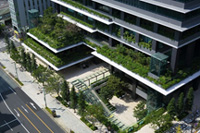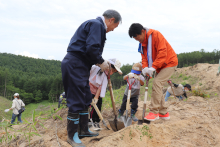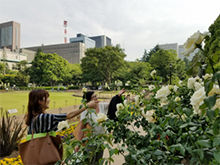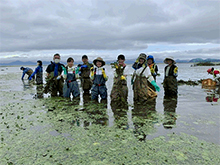- Home >
- Social Responsibility >
- For Environment >
- Environmental Action
Environmental Action
Efforts to Reduce Environmental Impact
Efforts to Reduce CO2 Emissions
We are continuously promoting energy-saving practices such as using stairs instead of elevators and adjusting display brightness. Additionally, we are gradually introducing and replacing energy-efficient equipment in facilities such as air conditioning and lighting. Furthermore, in 2019, we became the first Japanese life insurance company to join RE100 (*1), committing to using renewable energy for 100% of our electricity consumption. We have been actively reviewing electricity supply contracts, utilizing off-site PPA services (*2), and employing environmental values (*3) such as non-fossil certificates. As a result, by fiscal year 2022, we achieved 100% renewable energy consumption for our business activities, one year ahead of our initial target. Through these proactive efforts in both energy efficiency and renewable energy, our CO2 emissions in fiscal year 2022 were reduced by approximately 88.6% for Scope 1+2 and approximately 6.3% for Scope 3 compared to fiscal year 2019.
- *1 RE100: An international initiative aiming to procure 100% of the energy consumed in business activities from renewable sources.
- *2 A method of procuring electricity utilizing a scheme where our company installs its own solar power generation facilities in land separate from power demand facilities, and sends the generated electricity along with environmental value to the power demand facilities.
- *3 Electricity derived from renewable energy sources such as non-fossil fuel sources possesses an "environmental value" in addition to the value of electricity itself, as it does not emit greenhouse gases. Certificates that document this value are known as "green electricity certificates" or "non-fossil fuel certificates."
| Measures | Response by executives and employees | Facility improvements at offices |
|---|---|---|
|
|
Effort to Reduce Distribution Energy
Dai-ichi Life not only uses energy at its real estate properties, but also consumes a large amount of energy from the daily shipment of contracts, manuals, applications, invoices and customer notifications between its nationwide network of offices. As part of our measures to prevent global warming, starting in fiscal 2010 we examined both energy usage and cost of distribution between our offices, reduced the weight of documents and booklets, changed our in-house distribution operations (changed the size of shipping bags and reduced distribution volume), and decoupled our parcel depots.
Initiatives to Reduce Paper Usage
We have been advancing the digitization of subscription procedures and maintenance tasks to enhance customer convenience. Additionally, in our company, we have been actively promoting productivity improvements and reducing the use of office paper by establishing paperless meetings as part of our efforts to promote telework.
| Fiscal | Measure | Results |
|---|---|---|
| 2008- | Promoted elimination, consolidation and digitization of customer notices, etc. | We promoted the elimination, consolidation and digitization of customer notices after evaluating volume, and in fiscal 2008 we took steps to significantly reduce the types of distributed material. |
| 2008- | Revised the policy conditions provided during the term of the policy | We began creating customized policy conditions that are provided to customers during the term of their policy. This enabled us to reduce the average paper usage per policy by some 240 pages. |
| 2009- | Changed policy conditions provided at the time of application to a CD-ROM format | Starting in October 2009 we began providing policy conditions provided at the time of application in a CD-ROM format. This helped us to greatly reduce the number of pages in our guide on policy terms and conditions provided to policyholders. |
| 2009- | Efforts to Reduce Office Paper Usage | We promoted company-wide efforts to reduce office paper and copy paper usage, encouraging autonomous behavior change among employees, such as utilizing projectors during meetings, reducing distribution materials, and enforcing double-sided printing and 2-in-1 printing. We also proceeded with the digitization of various administrative tasks. |
| 2010- | Reduced Mailbox File printouts | Starting in fiscal 2010 we changed the types of Mailbox File records, which helped us reduce paper used in office equipment by about 14.4 million sheets per year. |
| 2011 - 2012 | Began using thinner environmentally friendly paper and reduced excessive inventory of printed materials | We reduced paper usage by our product pamphlets by 808 tons compared to the previous year by switching to thinner paper |
| 2013- | Switched the paper used for our insurance design documents from specialized paper to all-purpose paper | We reduced paper usage by 1,733 tons compared to the previous year by reducing inventory through cutbacks in types of specialized paper and by reducing the unit weight of paper through the switch to all-purpose paper. |
| 2014- | Digitized enrollment procedures and created DVDs for Contract Guide—Articles of Incorporation and Policy Provisions | We made the enrollment process from insurance explanation and design to application entirely paperless, and recorded contract guides and terms and conditions for all products on a single DVD-ROM. These efforts helped reduce paper usage by 752 tons from the previous year. |
| 2016- | Introduction of Projectors and Screens | By installing large screens at each branch and sales office, we reduced by volume of distributed materials in an effort to promote a paperless office and boost productivity. |
| 2020- | Introduction of new groupware | From August 2020, we have started using Teams for office workers and sales leaders. We reduced CO2 emissions through the digitalization of meetings. |
| 2021- | Enhancement of paper reduction initiatives | We provide printing performance data for each department and individual to their respective supervisors to raise awareness of office paper usage and ensure printing is done only when truly necessary for work purposes. |
Promoting Paper Recycling
We are committed to reducing our impact on the environment by making efforts to reduce paper usage and recycling certain paper waste. Each of our offices collects paper waste and sends it to the head office for processing. All of this paper is in turn sent to a paper company to be chemically dissolved for reuse in cardboard and toilet paper as recycled paper. We stand committed to further reducing our impact on the environment through greater recycling going forward. In addition, the Toyosu Office has installed a "PaperLab" that can produce new paper from used paper, thereby enabling in-house paper recycling, reducing waste, and curbing the purchase of new paper.
Promoting Environmentally Conscious Printed Material
We proactively utilize environmentally conscious recycled paper to print envelopes and our business cards as part of our efforts to conserve resources. For business cards and envelopes, we are reviewing and sorting out the raw materials, and we are implementing environmentally friendly measures, including reducing the types of small-lot, high-mix envelopes.
Water Conservation Initiatives
We closely monitor water usage at each of our business offices. We are also working to continually reduce water usage at these business offices by installing water conservation equipment. At the same time, these business offices are also actively making use of reclaimed water.
Proper Processing of Industrial Waste
Used business machines, office equipment and furnishings from our business sites are disposed of as industrial waste after issuance of an industrial waste manifest in accordance with Japan's Wastes Disposal and Public Cleansing Act.
Our head office has been charged with the proper management of industrial waste, and as part of this effort we have been checking the issuance of such manifests at each of our offices nationwide in Japan once per year.
Ascertaining of Scope 3 Emissions
Dai-ichi Life calculates the amount of CO2 emissions it produces indirectly (Scope 3) given rising demand from society.
We calculated our indirect CO2 emissions for 8 of the 15 categories under Scope 3.
Energy Conservation Measures at Investment Properties
For investment properties owned by our company nationwide, we strive to improve environmental performance by introducing high-efficiency equipment during new construction, renovation, and rebuilding projects. Additionally, in terms of operational management, we continuously work on energy conservation, such as proper temperature management in common areas.
Example of Tokyo Square Garden (completed March 2013)

Tokyo Square Garden (Chuo-ku, Tokyo)
We are helping to roll out the latest technologies to protect the environment in various facets with an eye on the future and we created a green space of approximately 3,000㎡ called Kyobashi no Oka to help reduce the urban heat island effect. The Kyobashi Environment Station was also placed in the building as an advanced initiative to promote energy conservation in the area as a whole. It presents information on area energy management and environmental technologies.
This building construction project was selected by the Ministry of Land, Infrastructure Transport and Tourism as a leading housing/building project in CO2 control, and also has been recognized by many organizations. In 2015, the green space was highly evaluated and received the Minister of Land, Infrastructure, Transport and Tourism Award at the 14th "Rooftop/Wall/Special Greening Technology Contest (Rooftop Greening Category)".
Environmental Awareness Activities for Employees
Environmental Training for All Employees
We conduct environmental education training targeting all employees during the "Environmental Month" designated by the government, aiming to foster awareness among each individual about reducing environmental impact and conserving the environment. This includes understanding the severity of environmental issues and the company's environmental footprint, enabling appropriate actions. In the fiscal year 2023, we arranged video training sessions led by external experts to assess our environmental initiatives from an external viewpoint and identify required actions. Furthermore, we developed and distributed digital tools aimed at informing customers about the significance of environmentally conscious behavior and our efforts toward environmental conservation.
Employee Self-Assessment Testing
We conduct an environmental self-assessment test through our intranet system to measure the knowledge and efforts of individual employees. This self-assessment test features questions not only on our environmental initiatives, but also current environmental events to check the efforts of individual employees. This enables us to enhance knowledge while raising greater awareness.
Efforts to Protect the Environment
The Dai-ichi Life Forest initiative

Situation of tree planting
Since June 2022, we have started "The Dai-ichi Life Forest initiative" in Ashoro Town, Hokkaido. Through afforestation activities grounded in the community, which contribute to ensuring forest diversity and conserving biodiversity, and through the purchase of CO2 offset credits generated from afforested areas, we aim to contribute to the realization of a sustainable society, including climate change response and regional revitalization. Positioned as a symbol of our environmental efforts, taking into account the characteristics of life insurance business such as connection, long-term security, and inheritance to the next generation, we held workshops for employees and their families, such as making keychains using wood from Ashoro Town, during the employee family visit day held at our Toyosu and Hibiya headquarters in fiscal year 2023, to foster environmental awareness among our employees.
Promoting Green Procurement
We have been promoting green procurement, which prioritizes purchases of products with less of an impact on the environment, since fiscal 2009. We have established Green Procurement Guidelines and office consumables that conform to these green purchasing standards must be purchased through our in-house procurement system.Therefore, nine tenths of our stationery such as envelopes and business cards are complied with green procurement.
Proper Processing of Chemical Substances
Dai-ichi Life owns a large number of real estate properties. As such, we carefully monitor our compliance with relevant laws and regulations to ensure we eliminate environmental risks and factors behind environmental impacts, such as soil pollution, asbestos and PCBs (Poly Chlorinated Biphenyl), from these properties.
Managing Asbestos
Dai-ichi Life re-inspected all of its properties from fiscal 2009 to fiscal 2012 and took appropriate measures where required based on asbestos laws and regulations that contain rules on the prevention of asbestos related health damages.
Managing PCBs
We properly manage PCBs by monitoring the use of equipment containing hazardous PCB, such as capacitors and large transformers, and continually ascertaining the storage status of PCB waste. We also make reconfirmations at the time any property is sold in order to prevent the transfer of PCB waste. Disposable PCB waste is processed using proper means through contracts with disposal facilities and only after acceptance of such waste can be coordinated.
Processing of Fluorocarbons
We are adequately equipped to list the equipment with fluorocarbons such as air-conditioning unit and industrial refrigerator, in accordance with Act on Ensuring the Implementation of Recovery and Destruction of Fluorocarbons concerning Designated Products enforced on April 2015.
Proper Processing of Soil Pollution
We ensure an appropriate response to real estate acquisition in accordance with the relevant laws and regulations, and examine the eligibility based on environmental survey such as engineering reports.
Promoting Pro-environmental Behavior in Asset Management
As a "Universal Owner" with a large number of policyholders nationwide and a diverse portfolio of assets, we endeavor to engage in asset management that considers the environment. For more details on our efforts, please refer to the following link.
Initiatives for Biodiversity
Dai-ichi Life supports urban greenery initiatives and sustainable community development plans in order to support comfortable and healthy lifestyles through contributions to local environmental conservation and global environmental protection.
Three Urban Greening Awards

Since 1990, we have supported the three urban greening awards (the Green Environmental Plans Award, the Green Cities Award, and the Competition for Specialized Greening Technology) with the hope of contributing to the quality of life (QOL) of local residents through the creation of green urban environments and communities. These awards are linked to the goals of the SDGs proposed by the United Nations, and contribute not only to the creation of cities where people and nature coexist in harmony, but also act as a countermeasure against climate change and contributes to the conservation of biodiversity through tree planting.
Volunteer Activities for Environmental Conservation

Removing water weeds
Employees of Dai-ichi Life are involved in volunteer activities to contribute to local communities. All departments promote such activities.
In particular, we can use clean-up activity as an example of volunteer activities to protect the environment.
We carry out beautification activities around our offices, on the beach, and along the riverbed, and also participate in the lake water quality conservation activities through the removal of water weeds (trapa japonica).

